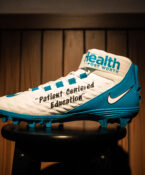Maximizing safety to minimize risk
 HSC Health, in partnership with SaferCare Texas, is building out a custom risk reporting solution with a data reporting company called Riskonnect that just launched for clinic use.
HSC Health, in partnership with SaferCare Texas, is building out a custom risk reporting solution with a data reporting company called Riskonnect that just launched for clinic use.
Riskonnect serves seven out of the 10 largest U.S. health systems and more than 170 health care and life sciences organizations, including 1400 acute care hospitals globally. While Riskonnect’s clients include ambulatory providers, HSC Health was one of the first to implement Riskonnect’s Ambulatory Care Event Reporting Portal solution.
“In an in-patient setting, reporting about adverse events or unsafe conditions is required, but that is not the case in the ambulatory (outpatient) setting,” HSC Health Senior Clinical Risk Services Manager Katie McKinley said. “We’re really going above and beyond for the safety of patients and employees.”
While HSC Health has always collected clinical risk reporting information, these antiquated paper and spreadsheet systems didn’t allow team members to easily quantify data or utilize it in any meaningful way.
“Safety is what our patients, their families and our interprofessional health care team members expect from us,” Interim Chief Medical Officer Janice Knebl said. “I believe that the Riskonnect tool and the Patient Safety education that will be available for our health care team members will put us on the road to becoming a leader in patient safety practices. I am very excited about bringing the Patient Safety recommendations to our ambulatory care environment!”
It takes a team
A partnership with SaferCare Texas broadened the horizons of the project. SaferCare was in the brainstorming stage of developing a new Patient Safety Organization and agreed to provide additional funds for this safety initiative. With a robust budget and a competitive bid process, HSC Health and the SaferCare team had many options to choose from.
“We definitely picked the right partner in Riskonnect to do this innovative work,” Tracy Chamblee, patient safety & quality executive for SaferCare Texas, said.
Chamblee initially reached out to HSC Health leadership to inquire about efforts to ensure a culture of safety. That’s when she was connected to McKinley.
“When I first came to HSC, one of my priorities was to seek opportunities to partner and collaborate with HSC Health,” Chamblee said. “The fact that SaferCare Texas was interested in starting a PSO focused on improving care in the ambulatory setting provided a great opportunity to do just that. It was during this time that I learned of Katie’s interest in implementing an event reporting system for HSC Health. This created synergy for the two initiatives, and the rest is history!”
Because HSC Health is one of the first clinics to purchase this package, the product was not ready to use out of the box. As the system is primarily intended for hospitals, it needed many adjustments to fit the needs of an ambulatory care clinic.
“HSC Health came into the project with so much knowledge about the software and what they wanted it to accomplish,” Riskonnect Project Manager Julie Pedlar Dinneen said. “We worked together to identify the best way to customize the software to suit their needs. Any questions or issues that came up were openly discussed and addressed. Our teams worked so well together. It’s a true partnership.”
More than a year of work has gone into customizing the package. McKinley recognized that including the medical directors, clinical managers, HSC Health Leaders and other team members in the design process was essential to making a lasting, functional product.
“I know some of what happens in the clinic, but if it doesn’t work from a clinician’s perspective, what are we doing?” she said. “For example, we added a mental health component to the patient behaviors module, so there’s a place to indicate if the patient was having a mental health crisis that was impacting their behavior and we can take that into consideration when evaluating how to best care for them.”
The customization of this product will allow the software to evolve as clinicians see risk trends within the clinic. For example, at the recommendation of one clinical pharmacist, the reporting module in Riskonnect will also have a place to indicate if an opioid was prescribed with or without Narcan to account for opioid risk.
Time & trust
“HSC Health’s use of Riskonnect can be a catalyst for HSC Health to improve, and for us to be a leader in safety, where students are seeing the best practices in safety,” McKinley said. “Over time, Riskonnect will help build transparency and trust to align our safety culture forward through a more formal platform to focus in and find areas of improvement.”
Team members can choose to report anonymously or provide their name. Providing your information is beneficial to resolving issues effectively and notifying reporters when their case is closed, but it is never required.
“Creating a culture of psychological safety will encourage staff to feel comfortable reporting,” Chief Nursing Officer Vicki Cannon said. “Trends in events will enable us to identify system issues and make effective changes to promote patient safety.”
After the launch of the event reporting system, the SaferCare team will partner with Riskonnect to build the PSO data repository component of the system to create a protected environment for all patient safety date to ensure a comprehensive approach to safety.






Social media